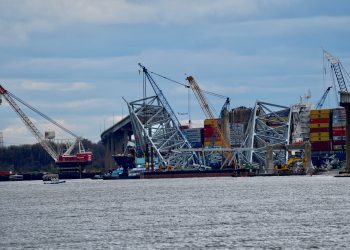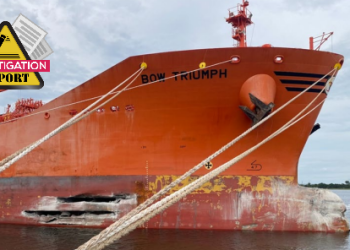On Tuesday, 26 March, the Francis Scott Key Bridge in Baltimore collapsed following a collision with the container ship MV Dali, creating a major impact in US trade and port operations.
According to the Associated Press (AP), manufacturers and shippers are facing disruptions as the Port of Baltimore remains shut down following the collapse of the Francis Scott Key Bridge. Supply chain experts expect other East Coast ports to handle Baltimore’s traffic, but with longer shipping times and disruptions. Moody’s Analytics economist Harry Murphy Cruise stated that most trade through Baltimore will relocate to other ports. U.S. Transportation Secretary Pete Buttigieg mentioned it’s unclear how long it will take to clear the bridge from the 50-foot-deep Patapsco River channel, AP reports.
The value of Baltimore Port
The port’s strategic location, being an overnight drive for two-thirds of the U.S. population and closer to the Midwest than any other East Coast port, makes it a vital freight destination, AP notes.
Baltimore is the ninth-busiest port in the U.S. for international cargo and leads in “roll on, roll off” cargo, primarily automobiles, but also including construction and agricultural equipment. Last year, the port moved 847,158 automobiles, with 70% being imports. Additionally, the port handles significant amounts of wood, steel, aluminum, home appliances, furniture, sugar, and liquefied natural gas. About 20% of U.S. coal exports pass through Baltimore, second only to Norfolk, Virginia, AP highlights.
The port also managed 1 million containers in the past year, accounting for 2.8% of the East Coast container volume, with a total of 11.7 million tons of cargo handled.
More than 50 ocean shipping and cruise companies do business with the port, with their vessels visiting about 1,800 times per year. Last year, over 444,000 passengers boarded cruise ships at the port, including those from Royal Caribbean, Carnival, and Norwegian.
Currently, many ships bound for Baltimore are waiting to be booked at other ports, causing delays of at least 24 days.
Looking for alternatives
With the closure of the Port of Baltimore, automakers and shipping companies are expected to divert their cargo to other East Coast ports, including Philadelphia, Wilmington, Newark, Norfolk, Charleston, Jacksonville, and ports in Georgia. The Georgia Ports Authority has mentioned its capacity to accommodate more cargo, but it can’t fully compensate for Baltimore.
As AP reports, the closure of the Port of Baltimore is estimated to cost the economy at least $15 million per day, affecting over 15,000 direct employees and nearly 140,000 indirect jobs.

































































